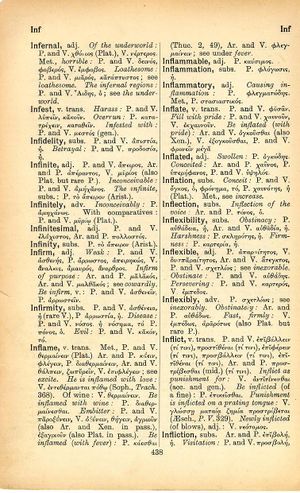infinite: Difference between revisions
From LSJ
m (Text replacement - "}}]]" to "}}]]") |
m (Text replacement - "(|thumb)\n(\|link=)" to "$1$2") |
||
| Line 1: | Line 1: | ||
{{Woodhouse1 | {{Woodhouse1 | ||
|Text=[[File:woodhouse_438.jpg|thumb | |Text=[[File:woodhouse_438.jpg|thumb|link={{filepath:woodhouse_438.jpg}}]]'''adj.''' | ||
|link={{filepath:woodhouse_438.jpg}}]]'''adj.''' | |||
P. and V. [[ἄπειρος]], Ar. and P. [[ἀπέραντος]], V. [[μυρίος]] (also Plat. but rare P.). | P. and V. [[ἄπειρος]], Ar. and P. [[ἀπέραντος]], V. [[μυρίος]] (also Plat. but rare P.). | ||
<b class="b2">Inconceivable</b>: P. and V. [[ἀμήχανος]]. | <b class="b2">Inconceivable</b>: P. and V. [[ἀμήχανος]]. | ||
Revision as of 17:15, 18 May 2020
English > Greek (Woodhouse)
adj.
P. and V. ἄπειρος, Ar. and P. ἀπέραντος, V. μυρίος (also Plat. but rare P.). Inconceivable: P. and V. ἀμήχανος. The infinite, subs.: P. τὸ ἄπειρον (Arist.).
Latin > English (Lewis & Short)
infīnītē: adv., v. infinitus.
Latin > French (Gaffiot 2016)
īnfīnītē¹⁶ (infinitus), sans fin, sans limite, à l’infini : Cic. Or. 228 ; Ac. 1, 27 || d’une manière indéfinie, en général : Cic. de Or. 2, 66 ; Gell. 14, 7, 9.
Latin > German (Georges)
īnfīnītē, Adv. (infinitus), I) grenzenlos, bis ins Unendliche, partes secare et dividere, Cic.: concupiscere, Cic.: quod faciendum est paene inf. in perorando, Cic.: infin. crescit, infin. minuitur, Augustin. epist. 3, 2. – II) unbestimmt, allgemein, Gell. 14, 7, 9: dah. auch abstrakt, inf. ponere alqd, Cic. de or. 2, 66.

